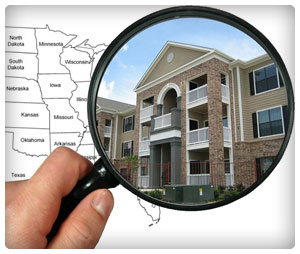Apartment Hunting from a Different City
Need a place in a new city?
It’s not easy to search for an apartment in an unfamiliar city. It’s hard to get the information you need and difficult to find people willing to work with you. But don’t give up.
If you try to find a place by blindly picking from available rentals, you might end up in a bad neighborhood or a dumpy unit. It’s better to have a more systematic approach. Here’s what to do:
Pick a Neighborhood
Before searching for an apartment, you should know the neighborhood you want to live in. Do some research and pick out a few neighborhoods that interest you.
- What are your options? – Run some basic Internet searches to identify the different neighborhoods in the city. Also, try to get a map of the city by running an image search, such as “neighborhoods in San Francisco”.
- Use what you know – If you know of city landmarks or famous areas, see what neighborhoods they are in.
- Read up on specific neighborhoods – Read the local paper to find some events and see where they’re taking place. If you have a neighborhood in mind already, see if it has its own newspaper or website, and check Wikipedia, which could tell you about demographics, events, places of interest and the general vibe of the neighborhood.
- Yelp – Yelp allows you to search for places by neighborhood. If you have something that you need in your neighborhood, like a dry cleaners, check Yelp to see which neighborhoods have it. If you already have a neighborhood in mind, check to see what’s in that neighborhood.
- Crime maps – Almost all cities have crime maps, which can be found through the local law enforcement agency’s website. Newspapers often have such maps as well. Use these maps to gauge how safe a neighborhood is.
Locate Apartments
Once you have a neighborhood or two in mind, start checking out apartments. Here are some resources for finding apartments:
- Craigslist – Many landlords advertise on Craigslist. It will let you narrow your search by neighborhood, price and size, so that you can quickly find what’s available that suits your needs. And it’s free.
- Apartment services – There are websites that collect apartment advertisements. They cost money to join, but they can be of great use, especially as a complement to Craiglist. They allow you to narrow your searches based on price, location and type.
- Hire a realtor – You can pay a realtor to search for you. This can be especially helpful if you are moving to an area that is competitive for good rents and locations. A realtor can be an advocate that gets your application to the top of the pile.
Make sure you check out numerous apartments so that you can get a general idea of pricing. You can also use Rentometer.com to learn what reasonable rents are in an area.
Check Out the Apartment Before You Commit
If you find an apartment that you want, don’t sign the lease without checking it out. If the landlord is requiring you to make a commitment earlier, such as by paying a deposit, see if you can have someone you trust check out the place for you. Here are some other things to do before committing:
- Check out your landlord – There are a lot of rental scams out there, especially in big cities. Before giving your landlord any money or personal information, get some references and conduct an Internet search on his or her name. Also, talk to them over the phone or, better yet, over Skype.
- Get pictures or video – Ask the landlord for pictures of the place. Some landlords might be able to provide you with video of the place as well.
- Google Street View – Google street view is a great way to experience an area without being there. You can type in the apartment’s address and see what it looks like from the street as well as the homes and businesses around it.
Consider Subleasing
If you don’t have a job yet, you might find it very difficult to locate a landlord willing to lease to you. Additionally, you might be reluctant to commit to a year’s lease without ever stepping foot in a place. Fortunately, you can sublease.
Subleases are leases where you rent from the renter, not the landlord. Often they are just for a couple of months, providing you with flexibility to move elsewhere once you find a job or a more-permanent place to live.
Here’s more information on subleasing apartments.
Related Articles
Moving without a Job
Moving Out: Budgeting Your Move and Beyond
How to Find a New Home



